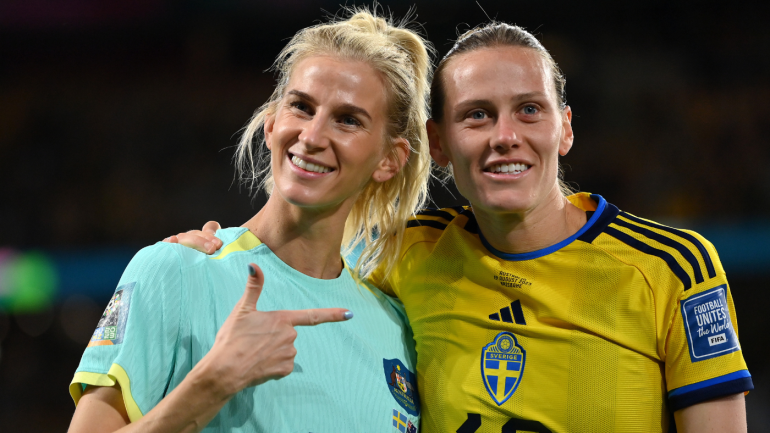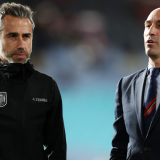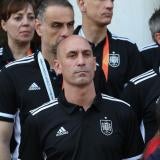
Some things change and some things stay the same. For Sweden at the 2023 FIFA Women's World Cup, it meant a bronze medal for the fourth time in their program's history. For co-host nation Australia it meant the highest-ever finish at a World Cup in the history of their program. The ninth iteration of the tournament has given the global audiences plenty of historic firsts, pleasant surprises, and shocking upsets, yet there's an aura of completion now that the two teams have ended their respective tournaments.
There's still a World Cup final to play on Sunday and for the first time since 2011 there will be a new nation crowned as champion. In a tournament that has checked off multiple record moments throughout the competition, the third and fourth-place teams will find consolation in other landmarks outside of a World Cup trophy.
Let's take a look at moments and players who made history in the third-place match:

Golazo Starting XI Newsletter
Get your Soccer Fix from Around the Globe
Your ultimate guide to the Beautiful Game as our experts take you beyond the pitch and around the globe with news that matters.
Thanks for signing up!
Keep an eye on your inbox.
Sorry!
There was an error processing your subscription.
Sweden's always at the party
Winning the World Cup is hard but maybe getting third place at the World Cup four different times feels like a kind of curse. The reality is that's an outrageous accomplishment for the program. Sweden now has the honor of being a semifinalist team five times at the tournament, were runners-up in 2003, and now have four bronze medals (1991, 2011, 2019, 2023) for the program. It's a remarkable feat to achieve, spanninng completely different eras of the program, especially in the most recent version of the World Cup, that for many is considered the most competitive in history.
Still, it's a quick mental turnaround that's required to compete for a World Cup medal after just falling short of stamping your place in a final. There is an even bigger shadow knowing your program has been in that moment multiple times. Ultimately, there's no shortage of impact the team has had on the country with players who have laid the groundwork for success. Though they fell short of the bigger prize again, there are players in the pipeline who will still work toward the breakthrough because of prior history at the tournament.
Matildas capture the hearts of a nation
Before the federation's bid to host the tournament, there was a long movement in place to build up the program. It consisted of a considerable youth movement a decade ago, with players working on their development in W-League, NWSL, and now FAWSL. Their fourth-place finish is the best in program history, and the best finish by a host nation since 2003. Ahead of the tournament they were considered contenders but faced some pressure early on when they had to navigate the group stage without their biggest star, Sam Kerr, with a calf injury and various knocks to other players along the way.
Despite missing a marquee player, the country rallied behind the squad, with packed stadiums and roaring atmospheres. There were moments of high drama, 20 penalty kicks, and anticipation around Kerr getting a chance to score a goal. Kerr did eventually get that goal on the biggest stage, and over the competition, the Matildas delivered the goods to the country and its citizens responded in return.
Who is the present and who has got next?
Sweden: After the semifinal loss, forward Kosovare Asllani said "I'm tired of crying big tournament tears." The 34-year-old striker has been with the team since 2008. While she wasn't part of the 2011 squad, she's been a key figure on big stages for multiple cycles now. There was probably no other player who understood the importance of seeing things through when she scored the insurance goal against Australia.
Sweden was simply clinical on the counter as the Blue and Yellow's captain Kosovare Asllani scores the Goal of the Day against Australia to double her side's advantage and secure the bronze medal 🇸🇪🔥 pic.twitter.com/j0Bo30iUK3
— FOX Soccer (@FOXSoccer) August 19, 2023
She hasn't made any official statements that this was her final World Cup and fans of the team may wonder, but there are players ready to walk the program forward. FC Barcelona player Fridolina Rolfo and Arsenal's Stina Blacktenius are two players just entering their prime, while Zećira Mušović cemented her place as the starting goalkeeper. The trio will likely be important players in the next cycle. There's 20-year-old Anna Sandberg at left back, who made her debut with the senior side just this year.
Australia: The Matildas showed off a mix of young athletes and players in their prime who may likely be around the next cycle. Hayley Raso and Foord stepped up in Kerr's absence, and while it took a few rounds, Kerr eventually did score what is now an iconic World Cup goal in front of home fans.
Sam Kerr's semifinal goal for Australia was an absolute stunner 🚀🎯
— FOX Soccer (@FOXSoccer) August 16, 2023
Relive it from every angle ⬇️ pic.twitter.com/2OtqbM5lOL
While they helped inspire a nation, it's now the younger players who have a massive tournament to carry with them in the next World Cup. Mary Fowler, the 20-year-old forward, scored a crucial goal to knock out Canada and help Australia advance into the round of 16. Kyra Cooney-Cross, the 21-year-old central mid, led midfielders on the team in chances created (8) and aerial duals (63.6%) and will be a key cog in the midfield in the future.





















